May 9-10, 2017 headlines
PewSitter
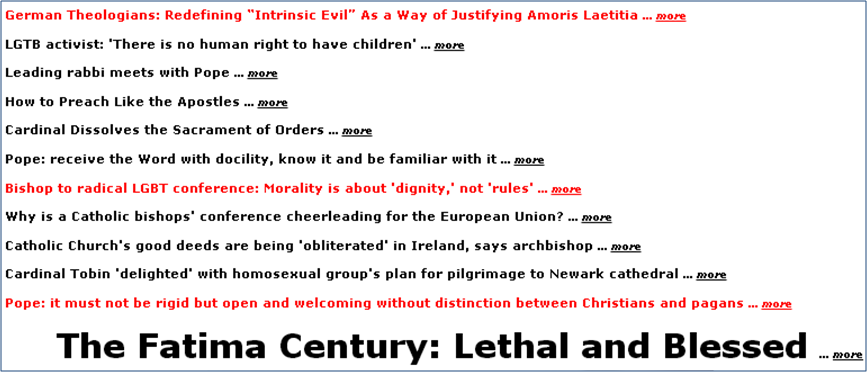 Canon212.com
Canon212.com
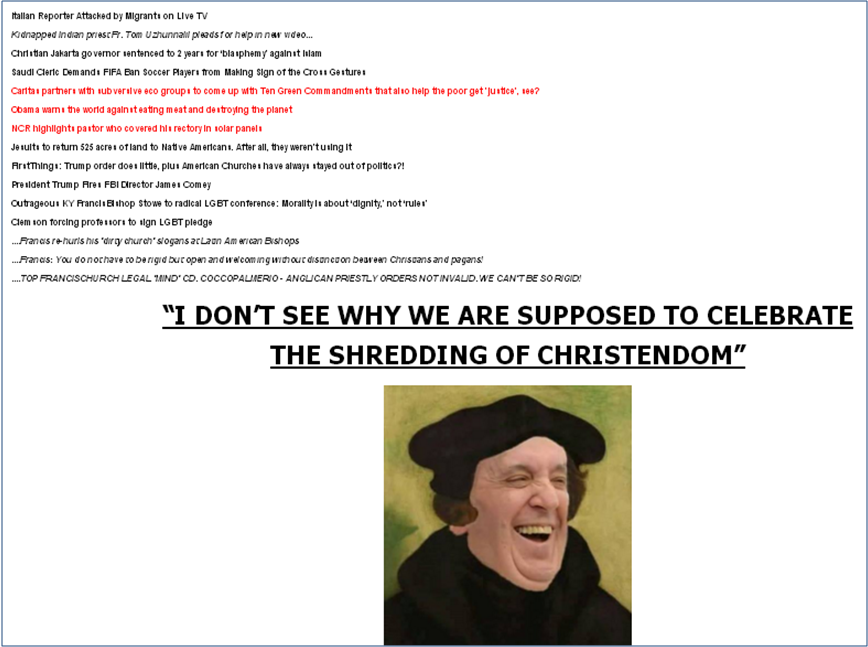 It's Father Z who's commenting on the Luther jubilee frenzy among Jorge Martin Bergluther and his Berglutherans...
I just don’t get the whoopdeedoo
It's Father Z who's commenting on the Luther jubilee frenzy among Jorge Martin Bergluther and his Berglutherans...
I just don’t get the whoopdeedoo
about Luther this year in the Catholic Church
[Not 'in the Catholic Church, Fr Z - in the church of Bergoglio]
by Fr. John Zuhlsdorf
Posted on 9 May 2017
I received a note from priest friend. He included a PDF of an article to be published. Here is the synopsis:
Synopsis: A close analysis of Kasper’s book on Mercy reveals a powerful embrace of Luther’s theology of grace and mercy. But Luther had no moral theology since, in his eyes, human beings are incapable good, and God’s mercy replaces his justice.
Beneath a panegyric to divine mercy, Kasper’s persistent theme is a diminution of divine justice against which mercy is revealed and illumined. The result is a trivialization of God’s mercy, the enormity of Christ’s sacrifice, man’s freedom of moral choice and participation in his own salvation, and by necessity, thereby, his dignity.
Look. I’m a former Lutheran. When I was in seminary, we had to read Kasper’s Christology books, the best Lutheran Christology I ever read!
In his book on Mercy, Kasper pretty much says what the Council of Trent anathematized.
I just don’t get the whoopdeedoo about Luther in the Catholic Church.
In the Lutheran churches (not real churches according to the CDF because they don’t have Apostolic Succession, etc.), I get it completely. If they want to celebrate Martin Luther, great!
But… should we?
There are many things I don’t understand about this.
Another thing I don’t get is why lots of women and many Jews are not upset by the big celebration of Martin Luther. Just read Luther, for heaven’s sake! Why are not feminists upset? Where are the women, for pete’s sake? Is this an example of what McCarthy describes in The Grand Jihad? The enemy of my enemy is my friend?
Luther didn’t say exactly kind things about Jews. Where are they with this? I don’t get it. Pope Francis used an analogy the other day about Syrians and camps and lots of people were upset. Read Luther on our Jewish elder cousins someday.
I don’t see why we are supposed to celebrate the shredding of Christendom. [Ask Bergoglio and Koch (who I find does great disservice to Benedict XVI who named him to the Pontifical Council for Promoting christian Unity)].
I know about the blah blah about things in the Church that needed reform in the 16th c and following, and even today. I’m a convert, remember?
Am I getting this wrong? Where am I wrong?
 Two comments on a newly reported outrage from the mouth [or pen] of one of Jorge Bergoglio's most outspoken surrogates these days,
Two comments on a newly reported outrage from the mouth [or pen] of one of Jorge Bergoglio's most outspoken surrogates these days,
the coconut-palm cardinal Coccopalmerio - who, most commentators forget, along with Cardinal Kasper, chaired (chairs?) the so-called
'Cenacolo degli Amici di Papa Francesco' which first began meeting shortly after the conclusion of the first 'family synod'...
In effect, Cardinal Coco-Nut, who is the President of the Pontifical Council for Legislative Texts, "in a recently published book...
calls into question Pope Leo XIII’s 1896 papal bull that Anglican orders are 'absolutely null and utterly void'."
BTW, Lamb does not think it necessary to tell us the title of the book. I went back to Google the cardinal's books in Italian to make sure
I don't miss anything, and his last published book, I see, was his booklet in defense of AL Chapter 8 (at which he infamously decided not
to attend its formal presentation). I cannot imagine what hook he used to get from AL to Anglican orders, unless he argues that 'the
Church' should also recognize all Anglican unions as valid, including those between same-sex bishops, presumably...
The ultraliberal UK Tablet, which reported this, started the story with the over-reaching premise that "Leo XIII’s remarks...have been
a major stumbling block to Catholic-Anglican unity". The Tablet, of course, ignores the fact that Benedict XVI requires Anglican
Anglican priests joining the Ordinariate first had to be ordained with Catholic Holy Orders, which none of the Ordinariate bishops and priests
around the world ever questioned.]
Herewith, two reactions: the first, from Ordinariate priest Fr. Kirk of the UK, who makes it the subject of one of his 'Frank and Justin'
correspondence series, ostensibly letters between this pope and the current Archbishop of Canterbury and chief Anglican primate, Justin Welby.
I looked up what the Latin title means - it's 'obstacle'.
Praepedimentae
by Fr. Geoffrey Kirk
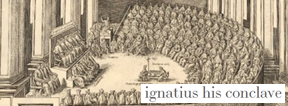
MAY 10, 2017
Dear Frank,
I read in The Tablet that your man Cardinal Coprophilia wants you to declare Anglican Orders pukka. [Pukka is an Anglo-Indian term meaning 'genuine'.]
Of course we would be delighted.
If they’re truthful most Anglicans have a residual anger about Apostolicae Curae [Leo XIII's Papal Bull of 1896 in which he ruled that Anglican orders are invalid. Note to the Tablet writer, Christopher Lamb (who also spun the Knights of Malta mess for the Tablet): The statement by Leo XIII was not a mere 'remark' but the subject of a Papal Bull].
Being called ‘absolutely null and utterly void’ does rile a chap somewhat. At the very least, it’s not very ecumenical. So it is good news that you are thinking of doing the gentlemanly thing after all.
However, I must make one thing plain.
The acceptance of the validity of Anglican Orders must include those conferred on women. [Gotcha, Cardinal Coco-Nut! Bet you didn't think of that, huh? Or maybe you did, projecting forward to when the church of Bergoglio does ordain women!] We are nothing if we are not egalitarian. And, in any case, I don’t want hours of fruitless wrangling with Martyn Percy [Anglican priest, academic and author, current Dean of Christ Church College in Oxford, who has a progressive outlook on a number of social issues, such as LGBTQ rights and the ordination of women].
Personally I don’t see how you can do it. I have not read Coprophilia’s paper, so he may well have come up with some witty scheme for separating the sheep from the goats which has eluded me. But all must have an equal bite of the cherry! On that we are quite adamant.
Heigh-ho! It always seems to be the same with sweeping ecumenical gestures. No sooner are they made than some passionate ideologue comes along and puts a spoke in the wheel.
Ut unum sint.
Your friend Justin
The second reaction comes from canonist Edward Peters:
Questions relating to Cardinal Coccopalmerio’s
comments on Anglican orders
Was Leo’s 'Apostolicae curae' an exercise of the extraordinary papal magisterium, making infallibly certain
the invalidity of Anglican orders and thus requiring Catholics to hold them 'absolutely null and utterly void'?
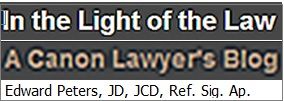
May 10, 2017
A rock dropped into quiet waters produces a visible splash and observable ripples. The same rock thrown into a storm-tossed sea, however, passes unnoticed, for its effects are overwhelmed by larger and wider waves.
Before the splash of Cdl. Coccopalmerio’s startling comments toward recognizing Anglican orders disappears in
the theological chop that is the new normal for Catholics, let’s record some questions deserving of consideration.
Note, the only source I have for Coccopalmerio’s comments is
The Tablet and, as that site sets the stage for its report by recalling “Leo XIII’s
remarks [on] Anglican orders” — as if Leo’s
Apostolicae curae (1896), which declared Anglican orders “absolutely null and utterly void”, simply conveyed, you know, some “remarks” — one is not reassured that
The Tablet [or at least, writer Lamb] fully grasps what is at issue here.
In any case, no Tablet quotes attributed to Coccopalmerio directly attack Leo’s ruling (we are not even told what language the cardinal was speaking or writing in, and I think that is an important point) so there is some room for clarification.
[Since Lamb claims that the cardinal made this statement in a book, presumably written originally in Italian - and surely Lamb reads Italian, so we must assume the cardinal did say what he is claimed to say.]
But, if Coccopalmerio said what
The Tablet reports him as saying, the following questions would warrant airing.
1. Was Leo’s
Apostolicae curae an exercise of the
extraordinary papal magisterium, itself making infallibly certain the invalidity of Anglican orders and thus requiring Catholics to hold them “absolutely null and utterly void”? I think it was, and I think we must, but I am open to counter arguments.
2. Or, was
Apostolicae curae a prominent exercise of the
ordinary papal magisterium which coalesced with several centuries of other ordinary exercises of papal-episcopal magisterium in rejecting the validity of Anglican orders to the point that Catholics must hold them invalid?
I think they surely came together thus and so hold that Catholics must regard Anglican orders as null. I can scarcely see any counter argument, let alone a plausible one, here, but if someone wants to offer it, I would listen.
3. Or, finally, does
Apostolicae curae, and the effectively unanimous rejection of Anglican orders by Catholic authorities over the centuries, and
the express inclusion of the invalidity of Anglican orders by then-Cdl. Ratzinger in his doctrinal commentary on Ad Tuendam Fidem (1998)
as something known with infallible certainty, and therefore as something to be held definitively by Catholics, leave any room whatsoever for speculating on, let alone defending, the possible validity of Anglican orders? Surely the question is rhetorical.
Next, if the answer to any of the above scenarios is Yes, do we not then face the situation anticipated by Canon 750 § 2 whereby
one who rejects an assertion “proposed definitively by the magisterium of the Church” is in that regard “opposed to the doctrine of the Catholic Church”?
And, if the answer to that question is Yes, would not ‘obstinacy’ (which, I hasten to add, can scarcely be proven by a few comments) in rejecting a “doctrine mentioned in can. 750 § 2” leave one, following fruitless admonition by the competent ecclesiastical authority, liable to a “just penalty” under Canon 1371, 1º?
Now, besides the possibility that Coccopalmerio did not say what The Tablet thinks he said, or that he said it but, on further consideration, he wishes to revise his remarks, the only other accounting I can come up with for his remarks is that, while Anglican orders are themselves invalid, some Anglicans are nevertheless validly ordained — not in virtue of their Anglican orders, to be sure, but in virtue of a post-Edwardian reintroduction of valid orders (conferred by break-away Catholic bishops or Orthodox prelates), such that a given Anglican minister might, by doing an ‘ordination pedigree’ search, be able to trace his orders back to a prelate possessed of valid orders.
Such a query can be tedious, of course, and it might impact only a small number of Anglican ministers, but I think it only fair to acknowledge the possibility. (For what it’s worth, I think the Roman decision to ordain “absolutely” all Anglican ministers coming into full communion who wish to serve as priests — if applied without regard for the possibility that some could trace their orders to a bishop with valid orders — is problematic). Maybe this unusual source of sacramental validity is what the prelate had in mind.
If, by the way, our speaker above were not a credentialed canonist, I would pause to make it clear that
the canonical-doctrinal conclusion of the invalidity in Anglican orders does not, repeat not, mean that “nothing happened” at, or as the result of, the rites undergone by Anglican ministers. Such rites can of course be occasions of great grace for their recipients and ministry conducted in their wake can, and doubtless has, helped many to grow closer to Christ.
But canonists need no reminding that
the power of a devotional rite to dispose one toward a closer cooperation with grace is not to be confused with whether a specific sacrament was (i.e., validly), conferred thereby, and so I mention this point only for the sake of others following this discussion.
In the end, though, perhaps the prelate said exactly what
The Tablet claims he said, and perhaps he meant it just the way it sounds. If so, I grant, he would not be alone, at least not in, how to put this?,ruminating around the possible validity of Anglican orders.
That said, and as important as the above questions might be, the cardinal’s further statement, one directly attributed to him, also deserves a closer look: namely, that
the Church has “a very rigid understanding of validity and invalidity: this is valid, and that is not valid. One should be able to say: ‘this is valid in a certain context, and that is valid another context.'”
That, folks, is huge.
[Yup, the deadly sting in the scorpion's tail!]
But, one issue at a time, shall we?
BTW, if the Coco-nut Cardinal really represents Bergoglio's thinking about Anglican orders - very likely, after all, since no pope has been so aggressively 'ecumenical' even at the expense of Catholic doctrine, i.e., plainly and simply anti-Catholic. If he can allow interfaith communion with Lutherans who do not believe in Trans-substantiation, recognizing the validity of Anglican ordination is surely a much 'shorter step' to take! - then Leo XIII joins St. Pius X, St. John Paul II and Benedict XVI as popes whose magisterium this pope does not have any qualms about trampling down.
Phil Lawler's comment echoes my conjecture:
“When someone is ordained in the Anglican Church and becomes a parish priest in a community, we cannot say that nothing has happened, that everything is ‘invalid’,” writes Cardinal Francesco Coccopalmerio in a new book.
But isn’t that pretty much what Pope Leo XIII did say, when he declared Anglican orders “absolutely null and utterly void”? Yet the statement by Cardinal Coccopalmerio cannot be dismissed lightly, since he is president of the Pontifical Council for Legislative Texts: the Vatican body that is responsible for the official interpretation of the Code of Canon Law.
He argues that the Church has suffered from “a very rigid understanding of validity and invalidity.” (And “rigidity,” of course, seems to be regarded as the one unforgiveable sin in his pontificate.) Are we being prepared for another break with the teaching of previous Pontiffs?
Then there's Hilary White, who thinks the discussion over Anglican orders is pointless because a) it's a carryover from the mid-1960s by the surviving but now-doddering Vatican-II dodos (well, I take that back, since the biggest dodo now happens to be pope!) and b) there are very few Anglicans left anyway, goes on to the more problematic issue about Cardinal Cocco-nut:
But a much more fundamental issue is actually at stake (albeit being stirred in the world’s smallest and least interesting teapot), and it’s about the nature of truth. To Catholics of the past, doctrine was like math: a description of objective reality. But that language is out, right?
The reason its important to say that then it was no but now it’s yes, is that:
The. Most. Important. point of all of FrancisChurch is that a “no” can be made into a “yes”.
How? Because, power. The only thing this pontificate is about is power.
All you really have to do is wait a while, and talk enough marshmallowy, Anti-Rational gibberish, and hold out until your audience is so intellectually ill-formed and morally stunted that they can’t tell the difference between “development of doctrine” and denial of it.
And BINGO! Aren’t we ever there! Leo XIII? Oh man! That guy was SOOooooo 19th century! This is the current year! Times change! A man can become a woman, marry a woman who became a man, and have the pope call them a “married couple”. (Yep, not making that one up either.)
Believe me, their time has come. We are in the age when people talk about “moving past” the logical principle of non-contradiction … and they think they’re really saying a Thing.
But no. It’s not about Anglicans.
P.S. Canon212.com has updated its 'above-the-fold' headlines for May 10:
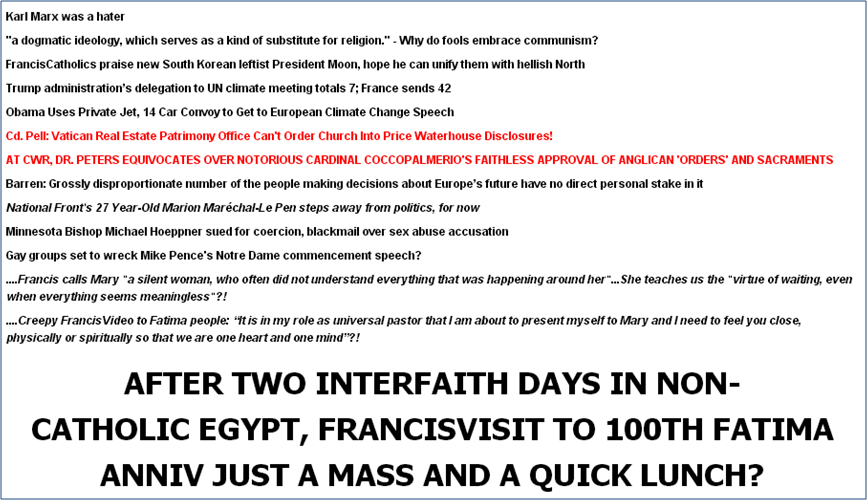
Perhaps Bergoglio's hommage-to-Luther trip to Lund, Sweden, last Halloween, totalled more hours than he is willing
to spend in Fatima!
[Modificato da TERESA BENEDETTA 12/05/2017 03:50]